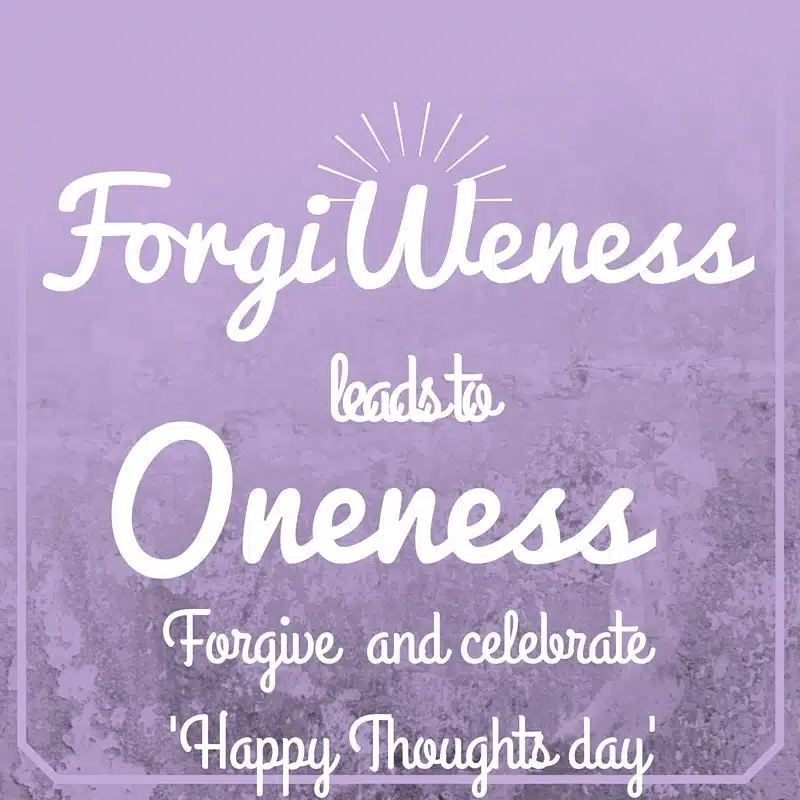No products in the cart.
Return To Shop
Forgive at least two people today. Out of the two, one is you!
Every year, we in Tejgyan Global Foundation celebrate 26th January also as “Happy Thoughts” day. It is a day that serves as a reminder to be truly liberated. Read this comprehensive guide by Sirshree on forgiveness and practice it to truly celebrate Happy Thoughts day and make every day a Happy Thoughts day.
The Need for Forgiveness
Assume you are at a strange banquet with several stalls that serves various thoughts instead of a variety of food. The rule is you can visit only one stall and pick only one thought of your choice.
The first stall offers a hot and spicy dish called ‘anger’, the second stall offers a bitter item called ‘hatred’, the third one offers a pungent dish called ‘worry’, the fourth offers a sweet dish called ‘pleasure’, while the fifth offers a bland dish called ‘boredom’. There are several such stalls in the banquet. The last one offers a wholesome dish called ‘forgiveness’. The stall of forgiveness is somewhat deserted compared to the teeming crowd at other stalls.
Most people in the party seem to be in some kind of pain or illness. Only a few people appear fresh, and healthy. They are the ones at the forgiveness stall. When these people were asked the secret of their wellbeing, they replied, “The only secret of our wellbeing is forgiveness. Forgiveness is the only thing that has freed us from every pain, sickness and irritation.” Every person visiting the forgiveness stall went back with the wealth of love, joy, peace, abundance and complete health.
The banquet symbolizes life on Earth. The stalls represent thoughts that mind wishes to chew on continuously. The food items at each stall represent emotions that arise when we chew these thoughts. The food that we chew has a radical effect on our health, either positive or negative.
If you like to return from the banquet cheerful and feeling calm and happy, you need the wholesome intake of forgiveness.
When one questions the need to take a medicine, claiming they are not sick, it only means they need a greater dosage of this medicine. Most people on Earth think they don’t need to forgive or seek forgiveness. The common belief is, “Why should I apologize or ask for forgiveness when I haven’t done any wrong?” This very belief reveals that they do not understand the depth of forgiveness.
Forgiveness is the panacea that uproots every vice and illness, provides us physical, mental and social health, and puts us at ease. It works like a broom that cleans out the toxins of resentment, pain, guilt and hatred. It applies a soothing balm to heal deepest wounds in our inner mind.
Many of us tend to make wrong assumptions or judgments about our family, friends or colleagues due to some presumably negative incidents. The grudges that we hold within, cause negative emotions to stay on as residual impressions in our cellular memory. These impressions are seeds of disease. They mature, proliferate and manifest as visible symptoms.
We can experience complete and holistic health only when our minds are emptied of these impressions. We need to get rid of these sick memories. Our mistaken assumptions and judgments have led to negative reactions – negative words that we have spoken in the past, negative thoughts and feelings of hatred, anger, guilt, fear, boredom, depression, and so on. All this negativity continues to stay on in our bodies as sick memories even today. These sick memories drain energy from cells of the body, making us lethargic and weak.
Benefits of Forgiveness
Forgiveness has several benefits. Few of them are:
1. Freedom from hurt or hate: When you forgive someone, you are freed from negative feelings of hate that you carry within. The hurt within you begins to heal.
2. Freedom from guilt: When you forgive yourself for any wrong doing or something you failed to do, you let go of the associated guilt. Learn the lesson from your past mistakes, but release the emotion. Forgiving yourself absolves you from guilt.
3. Living in the present: When you seek forgiveness or forgive others or yourself, your mind finds it easier to stop churning thoughts from the past. Instead of dwelling in past memories, you are able to live a fresh and spontaneous life, focusing on the present.
4. Connectedness with your true nature: The mind is usually clogged with hundreds of unnecessary thoughts that pollute it. Countless lines of arguments, complaints, hatred, jealousy, greed, and so on, make the mind impure and fragmented. By practicing forgiveness, as soon as an unnecessary thought clogs our minds, we become more positive and connect to the natural qualities within us such as love, joy and peace.
5. Feeling of completeness: When we seek forgiveness or forgive someone or ourselves, it brings a sense of closure. As we express or release suppressed feelings, we feel lighter and complete.
How to forgive or seek forgiveness?
With so many benefits resulting from forgiveness, the million-dollar question therefore is how to forgive or seek forgiveness. Let us look at few ways to do this:
1. Seek forgiveness directly: If you are comfortable asking forgiveness through direct interaction, reach out to the person and without any tinge of blame, with all your heart, consider saying something like: “Please forgive me for the hurt I caused you through my, words, actions, feelings, thoughts or my intentions. I will ensure that I don’t repeat the mistake.”
We should directly seek forgiveness at least from our near and dear ones. When we interact face to face and ask for forgiveness, the mind is purified of the vice immediately. Then the clouds of sadness, anger and suspicion that hover over relationships pass away sooner than we could imagine. When we reach out to seek forgiveness with honesty, often the other person realizes the part they were playing in making the relationship sour.
If the other person is not ready to forgive, do not assume that this situation is beyond repair. Attempt to seek forgiveness after some time or seek forgiveness mentally as described ahead.
2. Seek forgiveness at the mental level: In many situations, we are not comfortable to ask for forgiveness directly. And in many other situations, we are too late to realize and acknowledge our mistake. The time to directly seek forgiveness may have already passed. In such situations, you can ask for forgiveness at the mental level by bringing forth the incident or person in question in your field of attention.
Seek forgiveness from the other person from the bottom of your heart by saying in your mind, “I seek forgiveness from you. Please forgive me for the hurt I caused you through my words, actions, feelings or thoughts. I will ensure that I don’t commit such a mistake again.”
3. Forgive others at the mental level: There are times when you carry a grudge for someone. If you have a feeling of hatred or complaint against someone in your mind, you can forgive him or her mentally. You can further seek forgiveness mentally for carrying the grudge.
By keeping your eyes closed, imagine the person in front of your eyes. Let go of the grudges against the other person by saying, “I am letting go of the hatred, resentment or complaint that I have held in my mind against you. I forgive you. I love you. I respect you. I seek forgiveness for carrying a grudge against you. Please forgive me.”
As soon as you forgive, you will sense the release of negative feelings such as hatred, resentment, hurt, guilt, etc. Even if you were to do just do it mentally, you might be surprised to find the other person’s feelings change towards you
4. Forgive Yourself: To forgive yourself for something you did or failed to do, close your eyes and recall the situation. To forgive and release those emotions, tell yourself, “Let go… Let go… I won’t hold onto anything… I am letting go of all the bondages. I am letting go of whatever I had held onto. I surrender these emotions to God and seek forgiveness. I am liberated from these emotions. Whatever happened was a result of circumstances and my understanding at the time. All that is now past. I forgive myself. I accept myself. I love myself.”
The Forgiveness Challenge
For many people it is difficult to forgive others, as they just cannot comprehend why they should forgive those who have hurt their feelings. They question the validity of the reason to forgive. It just seems irrational for them to forgive those that have hurt them. They doubt if they can sustain the act of forgiveness when people continue to hurt them emotionally. They continue to justify their response to people’s behavior. However, once you realize that by forgiving others you are doing a favor to yourself since it helps you to release your bottled up negative emotions, you will start seeing the light. Through the act of forgiveness you remain untouched from the bondage of karma and grow spiritually.
Often you can practice forgiveness 98% percent of times but it is difficult to forgive that one enemy in your life. This is similar to reaching the 98th square in the snakes-and-ladders game, where you are devoured by the snake and reach the bottom. If you are unable to forgive completely, you do not reach the summit. Practice forgiveness 100 % for every person and incident. The snake would then become a ladder of progress!
Spiritual Forgiveness – Not four, but just one method
The most important reason for one to practice forgiveness is to grow spiritually. As you grow spiritually, you begin to understand that the biggest hindrance to spiritual growth is assuming yourself and others as mere bodies – separate from the one existential experience of consciousness. Identification with the body is the main obstacle for self-realization. Forgiveness can become a great tool to grow spiritually. Seek forgiveness for considering yourself and others to be ‘individual’ bodies.
Thus, the deeper understanding behind the four methods seen earlier is that there is only thing you are seeking forgiveness for – for considering yourself and others as mere bodies. Whether you were hurt or you hurt someone, whether you are at fault or someone else is at fault – you are carrying an imprint that only reinforces the belief that “you” and “I” are separate individuals housed in bodies. Seeking forgiveness for carrying this belief is a powerful exercise that can propel you towards self-realization.
With this understanding that neither are “you” a body, nor am “I” a body; having comprehended that it is not actually four different aspects of forgiveness, but just one, let us examine an effective spiritual practice that one can practice everyday. In this practice, close your eyes and recall all the events of the day and pray to a higher consciousness or an entity that inspires you or someone you hold in reverence such as a spiritual master (Guru). You can look at all the incidents that led to resistance, hate, hurt or guilt and follow the steps as follows:
Step 1: Invite: “Dear divine form of xxxxxxxxx (the name of the person you want to forgive or seek forgiveness or your own name if you are forgiving yourself), I invite you into my field of awareness.”
Step 2 : Forgive : “I am letting go of the hatred, resentment or complaint that I have held in my mind against you. I forgive you. I love you and respect you. I apologize for treating you as merely a body. I didn’t’t acknowledge the presence of higher consciousness (Self, God) within you. Please forgive me for that.”
Step 3: Gratitude : “Thank you very much for coming into my field of awareness. Thank you… Thank you… Thank you.”
The practice described above is specifically designed for liberation – for freedom from the identification with the body. Do not consider them to be mere steps for forgiveness (Kshama), but consider it as a forgiveness practice that helps in liberation (Moksh Kshama).
Whenever you have a feeling of hatred or complaint against someone in your mind, or whenever you are filled with guilt, embrace this spiritual practice immediately. Make it a rule to recall your day and practice forgiveness before you sleep. Do not leave behind any bondage of karma for the next day. When you clean all bondages on the same day, you can be liberated from the past. Every night as you seek forgiveness from all those you hurt knowingly or unknowingly by considering them to be separate from the oneness of consciousness you open your heart.
At a minimum, forgive two people every day, including you. What does this mean? Before you go to sleep, recall the person you felt the most negativity for in your mind. Forgive that person for considering himself to be separate from divine consciousness. And forgive yourself too! Thus, the idea is : “Forgive two people every day. Out of the two, one is you.” When you do this, you are making two people happy every day. Out of the two, one is you!
~ Sirshree
Sirshree is the founder of Tejgyan Global Foundation. For an opportunity to hear Sirshree live in Pune on “How to take charge of your emotions” on 31st January from 1. p.m. to 4 p.m., contact +91 9921008060


















One comment
Sameer Darekar
This is wonderful. Thank you for sharing.